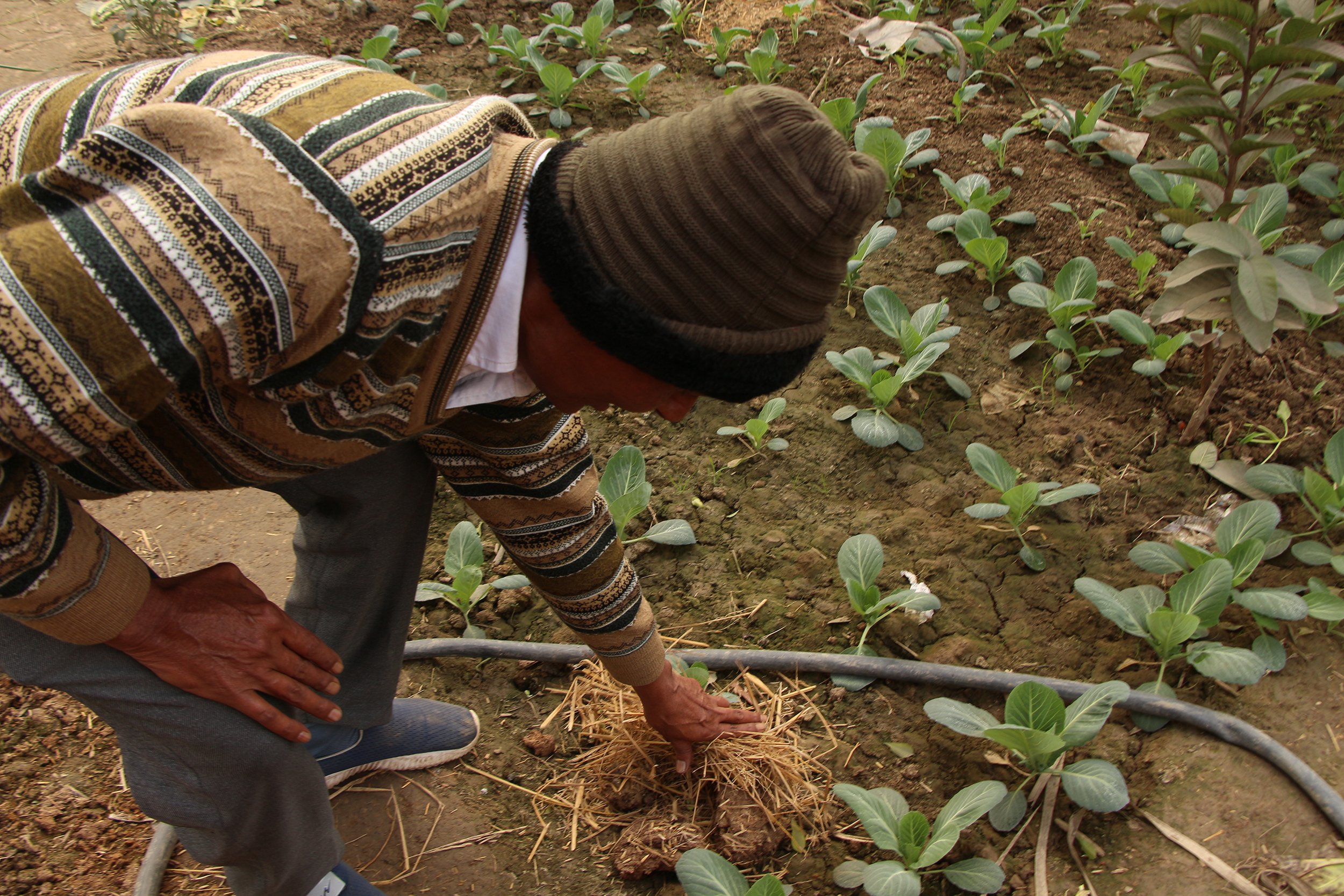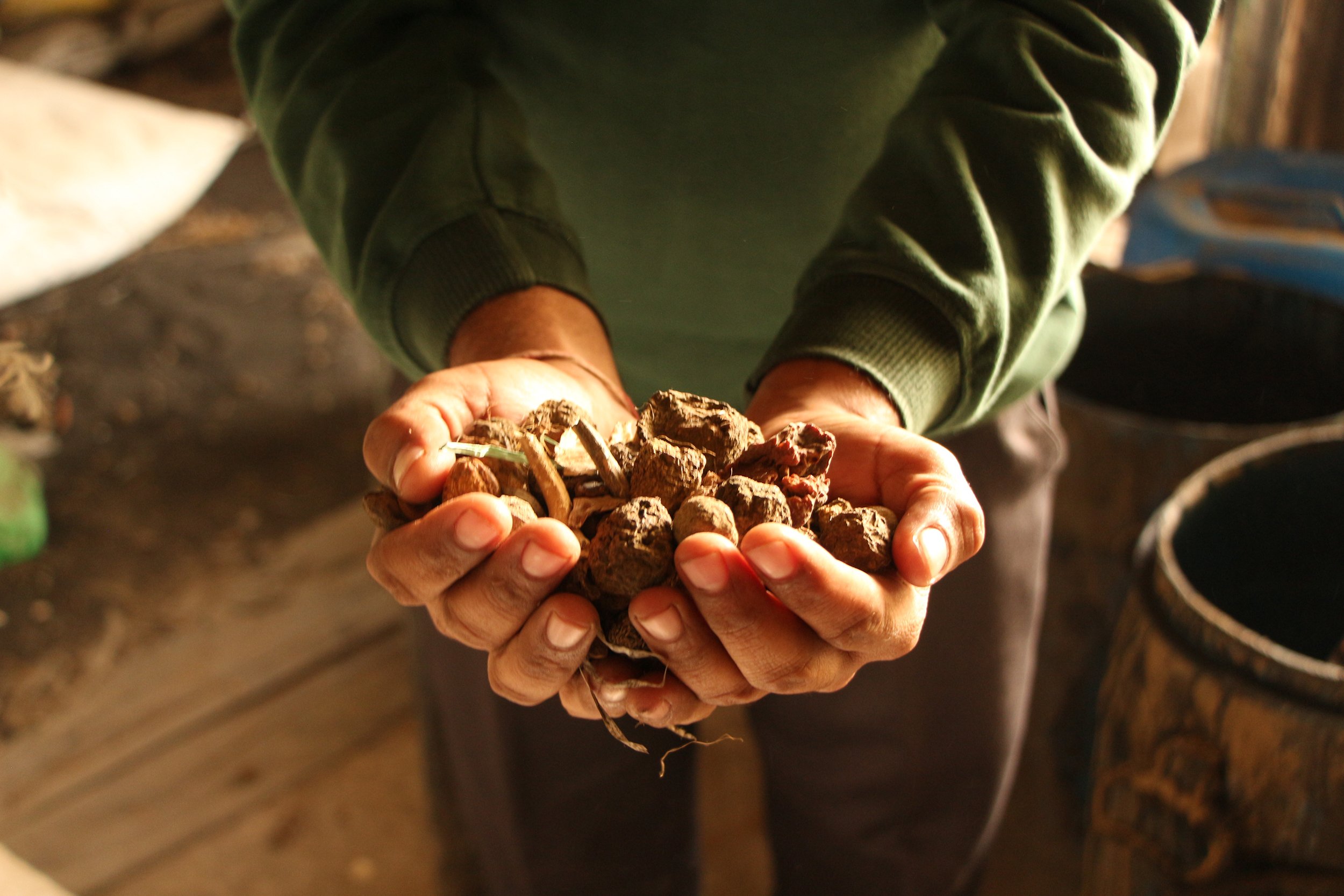Fertilizing the future
After a near-death experience from farming chemicals, Ishwar Singh spent 10 years perfecting an organic alternative. Now, he is on a mission to getthe rest of Haryana, India’s most agricultural state, to switch before irresponsible practices cripple the industry.
By Cyrus Ruch
Ishwar, 63, sits behind his desk at the Arable warehouse Jan. 9. He runs this company with the help of his two sons, Sunil and Susheel. “[My] work is not just about selling products, but stopping the spread of poison to farms,” Ishwar said. | Photo by Anna Pearson
Sitting at his desk, Ishwar Singh pointed at the awards lining the wall.
“The first is always the most important,” he said.
The award in question was a fourth-place consolation prize from the National Innovation Foundation. His shelf was lined with more prestigious awards, along with pictures of him next to Abdul Kalam, the former president of India. But this first award, he says, shows the first big accomplishment of a lifelong goal.
“Whatever we eat affects us, affects our body. The more we put out pesticides, the more we get sick.”
Ishwar keeps these awards in his office, along with certificates and books about agriculture. He says that he would read other books, but they don’t interest him. Ishwar is founder of Arable, an organic fertilizer company based in Kailram, a village in the northern state of Haryana, India. With the help of his two sons, he produces chemical-free products for farmers throughout the country, including spray for soil treatment, seed treatment and plant food.
All his products are made to fix one of India’s greatest problems: the long-term effects of poorly-managed farming practices. However, due to mistrust and tradition, he struggles to get farmers to adapt to organic, environmental solutions, even when, as he says, the benefits are clear.
After high school, Ishwar worked several jobs, including a tea shop in Delhi. Eventually, in 1988, he returned to Kaithal to work at a pesticide store for five years. Then one day, he spilled some phorate, a common and dangerous pesticide. The fumes he inhaled knocked him unconscious, and he lay on the floor for several hours until another shopkeeper found him and brought him to the hospital. His lungs and right ear were injured from the experience, and he still has trouble breathing and listening on that side.
Ishwar said the medicine doctors gave him didn’t work, and it wasn’t until they switched to using natural, organic medicine — Ayurveda — that he recovered. Two days later, when he left the hospital, Ishwar decided he needed to create a chemical-free alternative so that accidents like his couldn’t happen again to farmers or workers.
In 1995, Ishwar began crafting what he believed to be the perfect healthy fertilizer based on the same Ayurvedic practices that saved his life. For the next five years, he worked on this science during any free time when he wasn’t running his farming equipment and repair shop. Distant relatives thought he was a little crazy to be spending so much time on this project. He concocted new recipes to try on his infertile land.
Haryana farmer Kuldeep looks over the field that he saved using Ishwar’s products Jan. 12. Like many farmers, Kuldeep was distrustful of organic products until he tried Ishwar’s and saw its effectiveness. | Photo by Alyssa Malyon
One time, he tried five solutions and one of them managed to work. However, he realized afterward he didn’t remember the recipe for the successful batch, and spent a week of sleepless nights worrying he’d never find the solution.
“Now that I started, I don’t have anything else to do,” he said. “The shop that I had, I had no interest in. It was just for the income.”
Eventually, he perfected the recipe. He says it worked so well that awards from foundations started to pile up.
But local farmers continue to use non-organic farming materials out of tradition. These largely came about during the Green Revolution — a time period where intense changes happened in the farming industry in India — and the results have been mixed, according to scientists. Community organizer Kumar Mukesh noted little attention was paid to the long-term effects of these changes.
“Farmers faced economic pressures to ensure high yields and meet market demands,” he said. “Pesticides were seen as a quick and effective solution to protect crops and ensure a successful harvest, even though the long-term environmental and health impacts were not fully understood or considered.”
Kuldeep Kundu, a farmer who lives about 2 kilometers away from Ishwar’s workshop, sprays his crops with Ishwar’s organic option. For him, switching to organics was a last resort. After a heavy period of rain, Kuldeep found his wheat field flooded. The ground couldn’t absorb any more moisture, leaving his crops in danger of drowning, so he went to Ishwar for help. Ishwar gave him a product which he said would allow the soil to absorb more water, and said Kuldeep would only have to pay for it if it worked.
His field dried out. His crops and income were saved. This proof was enough to hook him. He began to use Ishwar’s products in his other fields. His mustard field grew bigger and faster than previous years.
Another relative of Kuldeep, Ramdia Kundu, made the switch after he saw firsthand workers being injured when pesticides got in their lungs while working. He became distrustful of side effects and wanted to find a healthier alternative to the harsh chemicals.
“Whatever we eat affects us, affects our body. The more we put out pesticides, the more we get sick,” he said.
But Kuldeep’s father and brothers, who share neighboring property, continue to use the old, toxic synthetic chemicals.




